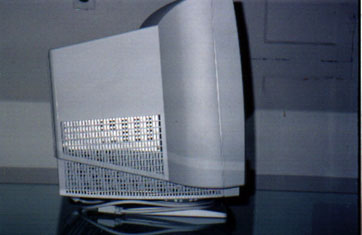|
Installation
was a no brainer. Plug in power to outlet and 15 pin D-connector
to the video adapter. The CM761U does come with a driver diskette
which includes color management files, an *.inf file, and a
readme file in case you have trouble installing the drivers.
Although, I did not experience any discrepancies with the drivers
so Win9x should detect it upon boot-up.

A
few things that stand out when toying around with this monitor
is that it produces a very clear, crisp , and bright image,
which makes overall use very comfortable and worthwhile. Even
after long periods of use I didn't experience tiredness or drowsiness
due to the high refresh rates which it supports. With a 0.22
mm horizontal and 0.14 mm vertical dot pitch, Hitachi's super
high contrast tube make both text and graphics appear bright
and sharp. Rest assured, with a viewable area of 18", the CM761U
allots enough space for you to have many open windows simultaneously
and the same applies if you are working with image creation/editing
programs such as Photoshop, Corel, etc. I expected some minor
flickering on the screen when I bumped up the resolution up
to 1600 X 1200 but with a refresh rate of 75 Hz flickering was
almost invisible to my eyes and therefore should not cause any
significant strain on my eyes. However, desktop icons get really
tiny at this resolution so if you have don't the greatest eyesight
you'll probably want to keep a resolution setting below 1600
X 1200.
Although
the CM761U has a footprint of 15.5" it's ability to produce
such crisp text and vivid graphics while not degrading image
quality is due to the CRT tube within the monitor. While most
manufacturers use a 90 degree deflection tube, Hitachi has chosen
to employ a 100 degree deflection angle tube design to allow
the the electron guns to be placed closer to the screen and
therefore monitor depth can be reduced. Another contributing
factor to the CM761U's success in superior image sharpness is
Hitachi's new electron gun assembly dubbed Narrow Extended Elliptical
Aperature, Multi-Dynamic Focus gun assembly. Essentially, the
difference from this gun assembly is that it is 5 mm narrower
in diameter, which allows the RGB beams which are hitting the
screen to have a much better focus on that particular segment
of the screen being drawn.
Next
>>
<<
Previous
|